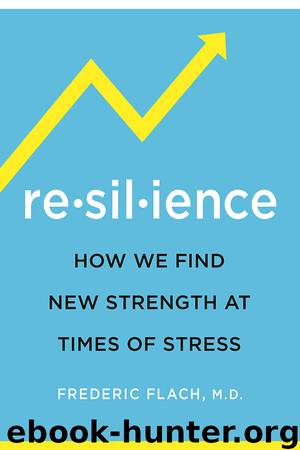Resilience by Frederic Flach & Frederic Flach M.D

Author:Frederic Flach & Frederic Flach, M.D.
Language: eng
Format: epub
Publisher: Hatherleigh Press
Published: 2020-06-22T16:00:00+00:00
Are They Antidepressants or Resilience Enhancing Drugs
The biogenic amine hypothesis set the stage for the development of drugs that accelerate recovery from depression; they increase levels of serotonin, norepinephrine and/or dopamine at nerve cell synapses, thereby affording an improvement in message transfer, helping protect nerve cells against damage, and perhaps even promoting the growth of new cells (neurogenesis) during long term use.
The first so-called antidepressant was imipramine (Tofranil). Its therapeutic effects were actually discovered by accident—not an unusual event in the history of medical progress. Dr. Ronald Kuhn was testing a new compound to see if it would be an effective tranquillizer in very disturbed schizophrenic patients. It was not. But in his non-schizophrenic control group, with the sharp eye of a gifted and open-minded investigator, he noted a significant amelioration of depression in a number of cases. As it happens, imipramine prevents the re-uptake of both serotonin and norepinephrine, so that larger amounts of these amines are present at the synaptic cleft. At the same time, another group of drugs called monoamine oxidase inhibitors were also shown to often be effective against persistent depression; these blocked enzymes that would otherwise break down serotonin and norepinephrine resulting in less of these amines being available to transmit messages.
Since the late 1950s, numerous other drugs have been developed along these lines. Most of the very recent ones are called serotonin re-uptake inhibitors and they do just that, block the re-uptake of serotonin and thus improve central nervous system operations. Some of them also increase the amount of available norepinephrine, and at least one acts primarily by increasing the amount of another biogenic amine, dopamine, at the synapse. And the latest members of this family of drugs appear to have fewer and fewer problematic side-effects.
However, a significant number of patients do not recover with these medications. Some of these may not have been properly diagnosed. In other, insufficient attention may have been given to important psychological and environmental factors and events. So now the hunt is on for new agents with other modes of action that may more directly enhance plasticity and resilience. One example is a drug called memantine, which has neuroprotective properties and has been used for years to induce mild and sometimes moderate improvement in mood, concentration and memory in patients with dementia; it is currently being evaluated for its effectiveness in depression.
But are they actually antidepressants? Do they, in fact, directly relieve the mood that besets the troubled patient? I do not think so, although my viewpoint may be considered somewhat controversial. To begin with, these medications are not only effective in patients who are diagnosed as depressed, but they also work in patients who are not depressed, who are considered to have various types of “anxiety” disorders such as generalized nervousness and worry. There is even some evidence that one or more of them may improve the outlook for patients who have suffered heart attacks. And you certainly wouldn’t get hooked on them; they don’t induce a false
Download
This site does not store any files on its server. We only index and link to content provided by other sites. Please contact the content providers to delete copyright contents if any and email us, we'll remove relevant links or contents immediately.
Should I Stay or Should I Go? by Ramani Durvasula(7641)
Why We Sleep: Unlocking the Power of Sleep and Dreams by Matthew Walker(6686)
Fear by Osho(4723)
Flow by Mihaly Csikszentmihalyi(4671)
Rising Strong by Brene Brown(4435)
Why We Sleep by Matthew Walker(4421)
The Hacking of the American Mind by Robert H. Lustig(4356)
How to Change Your Mind by Michael Pollan(4340)
Too Much and Not the Mood by Durga Chew-Bose(4321)
Lost Connections by Johann Hari(4163)
He's Just Not That Into You by Greg Behrendt & Liz Tuccillo(3873)
Evolve Your Brain by Joe Dispenza(3653)
The Courage to Be Disliked by Ichiro Kishimi & Fumitake Koga(3472)
Crazy Is My Superpower by A.J. Mendez Brooks(3380)
In Cold Blood by Truman Capote(3366)
Resisting Happiness by Matthew Kelly(3331)
What If This Were Enough? by Heather Havrilesky(3298)
The Book of Human Emotions by Tiffany Watt Smith(3284)
Descartes' Error by Antonio Damasio(3263)
